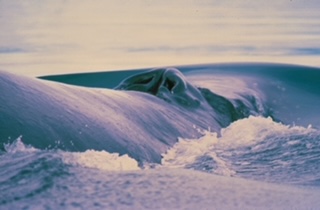
Shelley Gill and Whale Research
When my daughter Kye was five she loved to hang out with this curly blonde headed kid at her school, Lars. His mom was a humpback whale biologist. One day I got a phone call from his mom, Olga. She had asked Lars who would he like to invite to whale camp who had a mom she might like. The rest is history.
I have been going to Prince William Sound for the last 30 years to research humpback whales. We had a core group that taught us much about whale society. It was funny. The scientific literature said this species had no lasting associations, but we saw exactly the opposite. One of our papers tells the story of two separate clans of whales living in the same place but rarely interacting. In The Old Lady clan we had females with life long friendships who traveled (migrated) together, slept close to each other, hunted together, shared conversations over breakfast and complained, loudly, about rambunctious teenagers.
Our nonprofit, Winged Whale Research, has one of the longest running census studies in the world (1980-present). We use photo identification (taking photos of the underside of the whale’s fluke) to ID each whale. After photographing the unique pattern (like a human fingerprint) we submit those photos to a worldwide data bank called Happy Whale. We have learned about secret seamount rendezvous, boat strikes, fat whales feeding on hatchery smolt, the peril of fishing gear and ship strikes, how humpbacks hear and why we think they sing. Over the years technology has changed the way we study them and offered a plethora of new insights. Many species of whales have Von Economo neurons, also called spindle neurons, a large spindle-shaped cell that may allow rapid communication across the relatively large brains of humans, great apes, elephants, and cetaceans. In a nutshell these cells may be responsible for the layered feelings--empathy, love, forgiveness--scientists long thought were only experienced by humans.
Humpbacks receive sound through tissue, bone and muscle and their complex communications travel hundreds of miles under water. My new book (2026 maybe) Why the Winged Whale Sings, another tentatively titled Whale Camp, and my already published books Big Blue and If I Were A Whale are based on our work and adventures with whales.
Watch my TedX talk about The Wonder of a Whale.

Two nostrils of a whale's blowhole
If you'd like your students to get a taste of what it's like to have an adventurous spirit while they learn about the environment at the same time, contact us about scheduling a visit from Shelley.